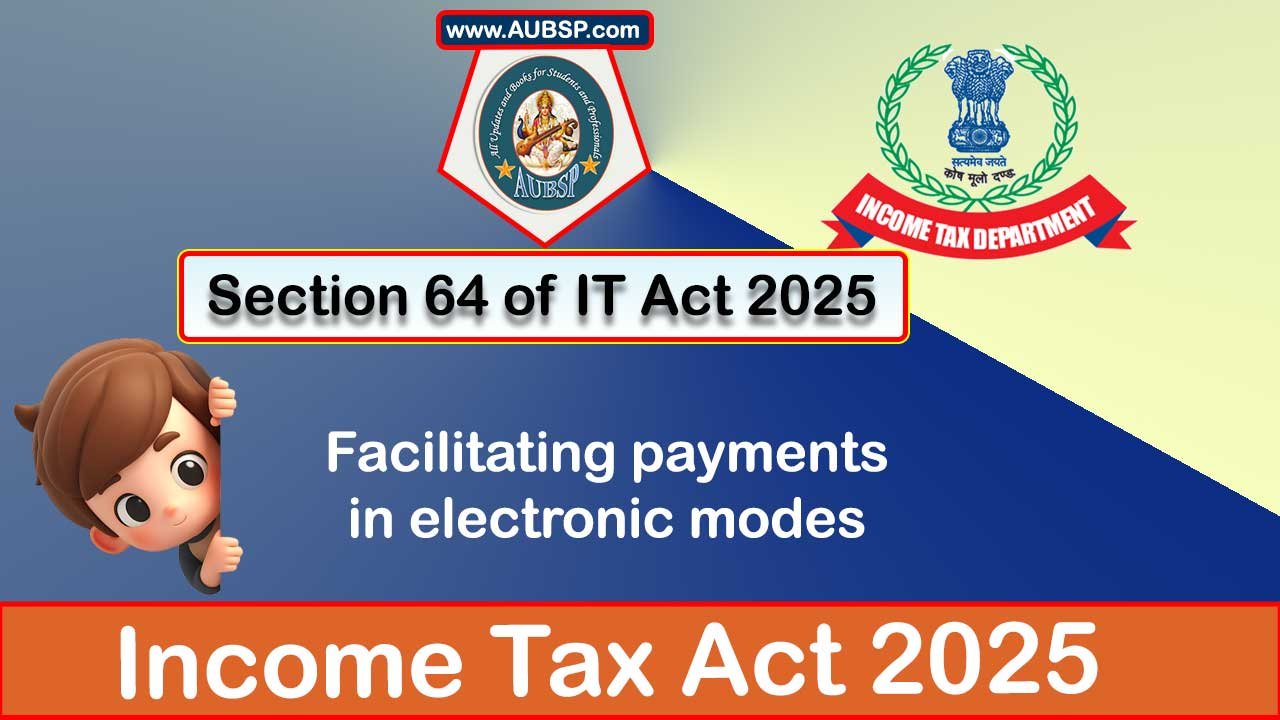Facilitating payments in electronic modes
[Section-64 as per the Income Tax Act, 2025 (this Act) w.e.f. 1st April, 2026.]
Any person carrying on business with total sales, turnover, or gross receipts exceeding fifty crore rupees in the preceding tax year shall provide facility for accepting payments through prescribed electronic methods, in addition to any other electronic payment methods, already offered.
FAQs on Section 64 of Income Tax Act, 2025
1. What is the objective of Section 64 of the Income Tax Act, 2025?
The objective is to promote digital payments by mandating certain businesses to offer prescribed electronic payment modes.
2. From when is Section 64 applicable?
Section 64 is applicable with effect from 1st April, 2026.
3. Who is required to comply with Section 64?
Any person carrying on business whose total sales, turnover, or gross receipts exceed ₹50 crore in the preceding tax year.
4. What is the threshold limit for applicability?
The threshold limit is ₹50 crore in total sales, turnover, or gross receipts in the previous tax year.
5. What does the term ‘preceding tax year’ mean in this context?
It refers to the financial year immediately before the current financial year.
6. What is meant by ‘prescribed electronic modes’?
These are specific digital payment methods notified by the government or prescribed under the rules of the Income Tax Act.
7. Is this requirement in addition to existing payment options?
Yes, businesses must provide the prescribed electronic modes in addition to any other electronic payment methods they already offer.
8. What are some examples of prescribed electronic payment modes?
Examples typically include UPI, BHIM, debit/credit cards, net banking, and other government-notified digital payment systems.
9. Is this provision applicable to professionals or service providers?
No, it applies only to persons carrying on business, not to professionals under section 44AA.
10. What happens if a business fails to provide the prescribed electronic payment modes?
Failure to comply may attract penalties as per the provisions laid down in the Income Tax Act or related rules.
11. Can a business offer only digital payment options and stop accepting cash?
Section 64 mandates the inclusion of prescribed electronic modes but does not prohibit the acceptance of cash or other legal modes.
12. Is a new business set up in the current year required to comply?
Only if the business’s turnover exceeds ₹50 crore in the previous year. For a new business, compliance would start from the year following the one in which the turnover crosses the threshold.
13. Is compliance required at all locations of the business?
Yes, all branches or outlets of the business must offer the prescribed electronic payment facilities.
14. Does this provision apply to e-commerce businesses?
Yes, if their total turnover exceeds ₹50 crore in the preceding tax year.
15. Will there be any tax benefits for complying with this provision?
The provision does not offer any direct tax benefit, but it ensures smoother transactions and may prevent certain penalties.
16. How will the government monitor compliance?
Compliance may be checked through tax audits, inspections, or information furnished in tax returns or under other reporting obligations.
17. Are foreign companies operating in India covered under this provision?
Yes, if they are carrying on business in India and meet the turnover threshold.
18. Is there a specific format or display requirement for providing these payment options?
Specific guidelines may be issued regarding display or mode of offering these options, typically under rules or circulars.
19. Can payment aggregators or intermediaries fulfill this obligation on behalf of the business?
As long as the prescribed modes are made available to the customers, the use of intermediaries is acceptable.
20. Where can businesses find the list of prescribed electronic modes?
The list will be notified by the Central Board of Direct Taxes (CBDT) and published in the official Gazette or Income Tax Rules.
Section 64 of the Income Tax Act, 2025, reflects the government’s continued push toward a digital economy. By mandating the provision of prescribed electronic payment modes for businesses exceeding ₹50 crore in turnover, it ensures transparency, ease of transactions, and better compliance. Businesses should proactively adopt these measures not only to meet statutory obligations but also to enhance customer convenience and trust.

